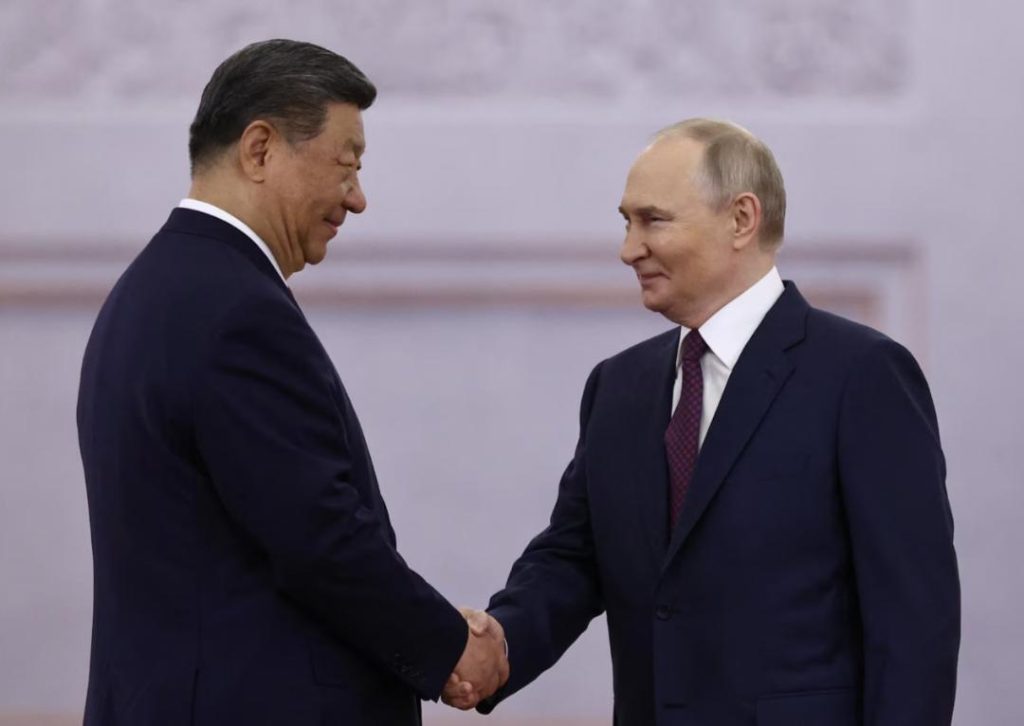
Russia & China Stand United Against Neo-Nazism: Vladimir Putin
In a show of unity against neo-Nazism, Russian President Vladimir Putin and Chinese President Xi Jinping came together to mark 80 years since the “sacred” victory over Adolf Hitler in World War II. The ceremony, held at the Kremlin, was a symbol of the strong bond between the two nations in the face of growing neo-Nazi threats.
Putin, in a speech addressed to Xi, thanked the Chinese President for joining him in commemorating the 80th anniversary of the victory over fascism. “The victory over fascism, achieved at the cost of enormous sacrifices, is of lasting significance,” Putin emphasized. He also praised Xi for his commitment to combating neo-Nazism, stating that their joint efforts would serve as a powerful deterrent against such ideologies.
The ceremony was a significant moment in the already-strong relationship between Russia and China. The two nations have been working closely together in recent years, particularly in the economic and military spheres. Their cooperation has been driven by a shared desire to counterbalance the influence of Western powers, particularly the United States.
Neo-Nazism has been on the rise in recent years, with far-right groups gaining popularity in several European countries. The resurgence of such ideologies has been met with concern from governments and international organizations, who worry about the potential for violence and instability.
Putin’s comments echo those made by Chinese leaders in the past, who have also spoken out against neo-Nazism and its harmful effects. In 2019, Chinese President Xi Jinping condemned neo-Nazism as a “vile” and “harmful” ideology, stating that it was a threat to global peace and stability.
The Russian and Chinese leaders have also been working together to promote a shared vision of a multipolar world, where the influence of Western powers is diminished. They have been critical of what they see as the aggressive actions of the United States and its allies, particularly in their treatment of countries like Russia and China.
In recent years, tensions have been rising between Russia and the West over issues such as Ukraine and Syria. The United States has imposed sanctions on Russia, and there have been allegations of Russian interference in Western elections. China has also faced criticism from the West over its human rights record and its military activities in the South China Sea.
Despite these tensions, Putin and Xi have remained committed to their partnership. In 2019, they signed a comprehensive agreement on strategic cooperation, which aimed to strengthen their economic and military ties. The agreement covered areas such as trade, energy, and infrastructure development, and was seen as a major step forward in their relationship.
The ceremony at the Kremlin was attended by high-ranking officials from both countries, including Russian Prime Minister Mikhail Mishustin and Chinese Foreign Minister Wang Yi. It was also attended by veterans of World War II, who were honored for their bravery and sacrifices.
In his speech, Putin emphasized the importance of remembering the lessons of World War II, and the need to continue to fight against neo-Nazism and other forms of extremism. He praised the veterans who had fought against fascism, stating that their sacrifices had enabled future generations to live in peace and freedom.
Xi, in his own speech, also emphasized the importance of remembering the past. He stated that the victory over fascism was a “sacred” moment in world history, and that it was essential to continue to promote peace and cooperation between nations.
The ceremony at the Kremlin was a powerful symbol of the unity between Russia and China against neo-Nazism. It showed that even in the face of growing tensions with the West, the two nations are committed to working together to promote peace and stability.
As the world continues to grapple with the rise of neo-Nazism and other forms of extremism, the ceremony at the Kremlin serves as a reminder of the importance of international cooperation and solidarity. It is a powerful symbol of the bond between Russia and China, and a call to action for all nations to work together to promote peace and stability.
Source:
https://www.reuters.com/world/europe/putin-greets-chinas-xi-kremlin-2025-05-08/



